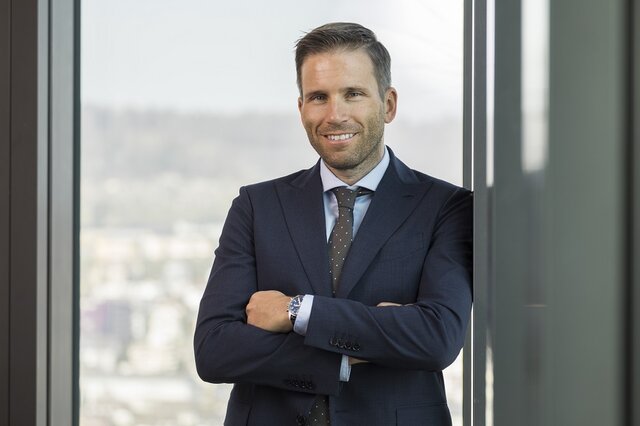
Swiss Prime Site Solutions was founded in 1999 as a group company of Swiss Prime Site and it develops customised services and investment products for customers in the real estate sector. CEO Anastasius Tschopp talks about the development of the company, broadening the product portfolio and the significance of commercial real estate.
Mr Tschopp, how important are new and innovative solutions in ensuring or even increasing the attractiveness of real estate products?
Innovation is important, and that goes for the real estate industry, too. Although it should be mentioned that real estate products have always offered innovations. Innovative products allow you to diversify on the market and even generate a return advantage.
You’re promoting individual solutions, but also the wider view.
On the one hand you have to know which sectors and usage types are on the up, on the other you have to plan real estate for the long term, in line with current building codes and zoning regulations. A lot of people right now would like to see greater flexibility in the use of space, but for a number of reasons it isn’t always feasible. The office of the future will need the same amount of space or even more, because now when all the employees in the company come together, they need meeting rooms and workstations that promote team thinking and the corporate culture. Working from home has long been a topic and many companies have been making use of it for years, even before the pandemic. The culture that you can experience on site is key in driving a company forward, it can even be the company’s success factor. Survey results and the reduction in vacancies in recent years clearly indicate that we will need as much space as before, or even more.
How has Swiss Prime Site Solutions developed over the last few years?
Swiss Prime Site Solutions was founded in 2017 with just a handful of employees. To begin with we were managing the Swiss Prime Investment Foundation with around CHF 1.4 billion and consultancy mandates for pension funds. In 2021 we acquired the asset management company Akara and took over the Akara Diversity PK fund. That same year we launched Swiss Prime Site Solutions Investment Fund Commercial and grew to a team of 80 with assets under management totalling CHF 8 billion. We have grown extensively over the last two years, both organically and through the acquisition of Fundamenta – with managed real estate assets in Switzerland and Germany – which was finalised in April 2024. We were able to greatly expand our range of products and we are now highly diversified with around 130 employees and comprehensive expertise in residential and commercial space. With a 360-degree management approach that covers all aspects, we have assets under management totalling CHF 12.8 billion. And all this as an independent asset manager that doesn’t run its own book.
And because of this sharp increase in assets under management you now have 130 employees.
For us it is important that each investor has the profitable solution that suits them. We aim to be a real estate platform for all investors. We also adapt to the individual wishes of our customers with a range of products that offers numerous opportunities, from 100% commercial to 100% residential.
“Innovative products allow you to diversify on the market and even generate a return advantage.”

How important were the most recent acquisitions – the Akara Group and the Swiss-German asset manager Fundamenta?
What’s always important is that the products we offer perform well. The 120 employees we have in Switzerland allow us to keep developing our expanded product range to full effect. We are structurally stable, we promote talented employees and generate innovations that are important for us and our customers. Modern analysis tools allow us to assess the potential of a property through key figures more quickly and reliably, which also benefits sustainability: is the property suited to district heating? What is the CO2 reduction pathway for the property? At the same time we have a reliable, transparent view of performance: how is the portfolio developing? What can we do to optimise it further?
Would you say that the appetite for real estate is increasing further among customers both institutional and private? How are the residential and commercial markets developing?
In Switzerland we are currently experiencing a high rate of immigration along with high employment levels. There is almost nowhere left for densification, with objections coming from all quarters – an attitude of «not in my backyard». There hasn’t been nearly enough construction in recent years, and this trend is persisting. In the commercial market, too, when we look at our products we are seeing low vacancies. Don’t forget that logistics companies, for instance, as well as companies that involve skilled trades and many other industries still need more production and storage space. You can’t do everything virtually online. A tiling company, for instance, will always need a depot for storage. So we still need an attractive building stock that grows alongside infrastructure and the population. We need new commercial space at the perimeters of A and B cities. Overall, I see far too little attention given to commercial building stock. I feel that the returns risk for this kind of space is greatly overestimated. For these investments you don’t have a dual risk like you have with residential space. «We don’t just reside in Switzerland, we live, consume, produce and work here as well.»
Are you seeing a change in demand for premium city centre sites? Where are the under-the-radar opportunities at the moment?
Demand for prime locations remains high. Market dynamics have picked up again, there is much more being bought and sold. Following years in which private equities and family offices dominated, the institutional investors are returning to the real estate market. And one thing is clear: if we want to build more in Switzerland again, we need the institutional investors.